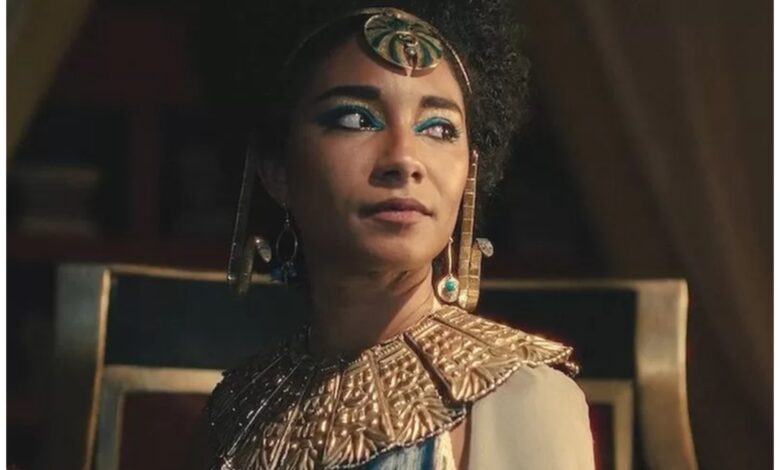
It wasn’t long after Netflix released its “Queen Cleopatra” documentary on May 10 that Egyptians were outraged.
The movie depicts Queen Cleopatra, who has Greek origins, as African – backing Afrocentric claims about the “Black” identity of ancient Egypt.
Stand-up comedian Kevin Hart was recently banned to perform in Egypt for supporting the Afrocentric Movement, following social media backlash from Egyptians.
Hart made statements prior to the event saying, “We must teach our children the true history of Black Africans when they were kings in Egypt, and not just the era of slavery that is cemented by education in America. Do you remember the time when we were kings?”
This raised anger among Egyptians who accused him of racism and falsifying Egyptian history.
Netflix’s movie does not differ much from Hart’s beliefs, after it became clear that the film was produced by Jada Smith, the wife of US actor Will Smith, who is Black, which prompted some to accuse her of supporting Afrocentrism.
But what sparked more controversy was the Netflix’s deletion of the petition created by Egyptians to collect votes against the presentation of the film, after the petition collected over 60,000 signatures.
Campaigns to boycott the platform then began to increase in Egypt.
What is Afrocentrism?
Afrocentrism is global movement and ideology that arose in 1928 and centered in the US. It spread widely in the 1970’s and 1980’s after the abolition of slavery in US.
The movement calls for African centralism. It has now become widespread among African communities in sub-Saharan Africa and among minorities in North Africa and the Middle East.
Afrocentrism is a “racist” movement that considers the elimination of the white race in Africa one of its most important goals.
It promotes allegations that modern Egyptians have nothing to do with the ancient Egyptian civilization history.
Afrocentrics claim that only Black Egyptians are purebred, and that light-skinned Egyptians are the result of Arab and European invaders.
The Afrocentric movement also believes that the Moroccan civilization as well as the Carthaginian civilization were Black civilizations, under the pretext that the first indigenous inhabitants of North Africa were Black, as they claim.
One of the largest adherents of the Afrocentric movement was Malcolm X, an African-American activist in the 1960’s.
“When you look at an ancient Egyptian pharaonic statue, you have to link the Black man with the ancient Egyptian, so make sure that you are looking at yourself and that the white man wants to steal this history for him,” he said in a recorded meeting.
The movement claims that one of the queens of Egypt, Tiye, wife of Amenhotep III in the 18th dynasty, had African features.
Afrocentrism emerged following campaigns to liberate slaves in the US, and from the desire of Black Americans to form an identity for themselves, explained the chief archaeologist at the Ministry of Tourism and Antiquities Magdy Shaker said.
Shaker told Al-Masry Al-Youm that Eurocentrism in contrast claims that Greece created civilization and that they created philosophy and drama. At first, the media paid great attention to Eurocentrism, but they did not stop at this point, so a group appeared saying that the Greek civilization was also the basis of the Egyptian civilization, he added.
Afrocentrics infer that current Egyptians are of Arab origin from the Arabian Peninsula who occupied Egypt while Black Africans gradually migrated to the south.
They claimed that Arab occupiers deliberately broke the noses of the Egyptian statues to erase any trace indicating their features and began to color the temples and archaeological sites in an attempt to blur the truth, Shaker said.
Shaker stressed that all these accusations can be answered with historical evidence.
Breaking the noses of the statues was due to the belief of ancient Egyptians that the soul can breathe through the nose, so they broke the statues’ noses to prevent souls from inhabiting statues.
As for the coloring of the temples, it is was to clarify archaeological signs on them, Shaker said.
Shaker added that Queen Cleopatra had light skin because of her Greek origins, which contradicts the claims of the Afrocentric movement.
He added that Cleopatra has statues and inscriptions on temples, showing her shape and features that have nothing to do with Africans.
Shaker concluded by stressing that the Egyptian government must take strict measures against these false allegations that distort Egyptian history and attribute it to others, before Egypt faces the same fate of Tunisia, which suffers from the existence of a large number of Afrocentrics without being able to control their actions.
This is a dangerous tactic working to change the demographic composition of the country, he added.
Shaker also stressed the importance of the role of anthropologists who specialize in mummy genes and their true forms, by publishing studies that confirm that Egyptian civilization is not African.
“After 20 or 30 years, people will watch the film. So, if we do not publish a response, people will start believing their allegations.”
Egypt fights back
Egyptian archaeologist Zahi Hawass said that during one of his lectures in Los Angeles, he was protested by people objecting to his refusal to consider Cleopatra being Black.
They carried banners with slogans against him, he said, adding that they had fallen for false information.
During a phone interview with “Hadith al-Qahira” (Cairo Talk) talk show on the “al-Qahira wal Nas” (Cairo and the People) channel, Hawass stressed “We are not against Blacks, and if the same situation happened with the continent of Asia, I would object to them.”
He emphasized that Cleopatra was burgundy in color, and not dark-skinned, and this a fallacy bought into by African Americans.
Hawass pointed out that “our film, which we released about Cleopatra, also received international attention, and this film responded strongly to the whole world.”
The Egyptian documentary channel “al-Wathaeqya”, of the Documentary Production Sector at the United Media Services Company, announced it has begun producing a documentary about the true story of Queen Cleopatra, one that aims to tell a historically accurate depiction of her life.
The documentary channel said in a statement that “Preparations have begun to produce a documentary about Queen Cleopatra VII, daughter of Ptolemy XII, known as Cleopatra, the last king of the Ptolemaic family, that ruled Egypt in the wake of the death of Alexander the Great.”
“Based on what is always usual in all the work of the Documentary Production Sector and Wathaeqya Channel, there are work sessions currently being held with a number of specialists in history, archeology, and anthropology. In order to subject research related to the subject of the film and its image to the utmost levels of research and study,” the channel assured.
And an Egyptian team consisting of several jurists and archaeologists demanded financial compensation worth two billion dollars from Netflix for distorting the image of Queen Cleopatra and ancient Egyptian civilization.
A letter submitted by the team to UNESCO stated that Egypt has the right to an initial compensation of two billion dollars for distorting the “Egyptian identity”.
The letter said Egypt also has the right to take legal measures to preserve the tangible and intangible Egyptian heritage, whether ancient or modern.
Edited translation from Al-Masry Al-Youm




